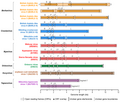Nyamiviridae
A family of negative-sense single-stranded RNA viruses
Nyamiviridae is a family of negative-sense single-stranded RNA viruses within the order Mononegavirales. This family includes viruses that primarily infect arthropods and vertebrates, including humans. Members of this family are known for their potential to cause disease in humans and animals, although many remain poorly characterized.
Virology[edit]
The Nyamiviridae family is characterized by its negative-sense RNA genome, which is typically non-segmented. The genome encodes several structural and non-structural proteins essential for the virus's replication and assembly. The virions are generally enveloped, with a helical nucleocapsid structure.
Genome[edit]
The genome of Nyamiviridae viruses is composed of a single strand of RNA that is approximately 10,000 to 15,000 nucleotides in length. The genome encodes for multiple proteins, including the nucleoprotein (N), phosphoprotein (P), matrix protein (M), glycoprotein (G), and the RNA-dependent RNA polymerase (L).
Replication Cycle[edit]
The replication cycle of Nyamiviridae viruses begins with the attachment of the virus to the host cell surface via the glycoprotein. Following entry into the host cell, the viral RNA is released into the cytoplasm, where it serves as a template for transcription and replication. The RNA-dependent RNA polymerase synthesizes complementary RNA strands, which are then used to produce viral proteins and new genomic RNA. Assembly of new virions occurs in the cytoplasm, followed by budding from the host cell membrane.
Pathogenesis[edit]
Nyamiviridae viruses can cause a range of diseases in their hosts, from mild febrile illnesses to severe hemorrhagic fevers. The pathogenesis of these viruses is often linked to their ability to evade the host immune response and cause cell damage.
Human Infections[edit]
Some members of the Nyamiviridae family are known to infect humans, leading to diseases that can range from mild to severe. Symptoms may include fever, headache, muscle pain, and in severe cases, hemorrhagic manifestations.
Animal Infections[edit]
In animals, Nyamiviridae viruses can cause diseases that impact livestock and wildlife. These infections can lead to economic losses in agriculture and affect biodiversity.
Epidemiology[edit]
The distribution of Nyamiviridae viruses is global, with different species adapted to specific ecological niches. Transmission can occur through direct contact with infected hosts or via arthropod vectors such as mosquitoes and ticks.
Prevention and Control[edit]
Efforts to prevent and control infections caused by Nyamiviridae viruses include vector control measures, surveillance of animal populations, and the development of vaccines and antiviral therapies. Public health strategies focus on reducing human exposure to vectors and infected animals.
Research[edit]
Ongoing research aims to better understand the molecular biology, ecology, and evolution of Nyamiviridae viruses. Advances in genomics and bioinformatics are providing insights into the diversity and pathogenic potential of these viruses.
Related pages[edit]
Nyamiviridae gallery[edit]
-
Viruses-11-00927-g001.E
-
Viruses-11-00927-g002.A
-
ONSR.Nyami.Fig2.v8
-
ONSR.Nyami.Fig3.v4
Ad. Transform your life with W8MD's Budget GLP-1 injections from $49.99


W8MD offers a medical weight loss program to lose weight in Philadelphia. Our physician-supervised medical weight loss provides:
- Weight loss injections in NYC (generic and brand names):
- Zepbound / Mounjaro, Wegovy / Ozempic, Saxenda
- Most insurances accepted or discounted self-pay rates. We will obtain insurance prior authorizations if needed.
- Generic GLP1 weight loss injections from $49.99 for the starting dose of Semaglutide and $65.00 for Tirzepatide.
- Also offer prescription weight loss medications including Phentermine, Qsymia, Diethylpropion, Contrave etc.
NYC weight loss doctor appointmentsNYC weight loss doctor appointments
Start your NYC weight loss journey today at our NYC medical weight loss and Philadelphia medical weight loss clinics.
- Call 718-946-5500 to lose weight in NYC or for medical weight loss in Philadelphia 215-676-2334.
- Tags:NYC medical weight loss, Philadelphia lose weight Zepbound NYC, Budget GLP1 weight loss injections, Wegovy Philadelphia, Wegovy NYC, Philadelphia medical weight loss, Brookly weight loss and Wegovy NYC
|
WikiMD's Wellness Encyclopedia |
| Let Food Be Thy Medicine Medicine Thy Food - Hippocrates |
Medical Disclaimer: WikiMD is not a substitute for professional medical advice. The information on WikiMD is provided as an information resource only, may be incorrect, outdated or misleading, and is not to be used or relied on for any diagnostic or treatment purposes. Please consult your health care provider before making any healthcare decisions or for guidance about a specific medical condition. WikiMD expressly disclaims responsibility, and shall have no liability, for any damages, loss, injury, or liability whatsoever suffered as a result of your reliance on the information contained in this site. By visiting this site you agree to the foregoing terms and conditions, which may from time to time be changed or supplemented by WikiMD. If you do not agree to the foregoing terms and conditions, you should not enter or use this site. See full disclaimer.
Credits:Most images are courtesy of Wikimedia commons, and templates, categories Wikipedia, licensed under CC BY SA or similar.
Translate this page: - East Asian
中文,
日本,
한국어,
South Asian
हिन्दी,
தமிழ்,
తెలుగు,
Urdu,
ಕನ್ನಡ,
Southeast Asian
Indonesian,
Vietnamese,
Thai,
မြန်မာဘာသာ,
বাংলা
European
español,
Deutsch,
français,
Greek,
português do Brasil,
polski,
română,
русский,
Nederlands,
norsk,
svenska,
suomi,
Italian
Middle Eastern & African
عربى,
Turkish,
Persian,
Hebrew,
Afrikaans,
isiZulu,
Kiswahili,
Other
Bulgarian,
Hungarian,
Czech,
Swedish,
മലയാളം,
मराठी,
ਪੰਜਾਬੀ,
ગુજરાતી,
Portuguese,
Ukrainian


